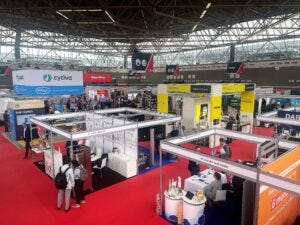May 12, 2023

Synthetic biology could be used to develop a new paradigm in controlling cellular function and specificity, according to a bioprocess engineer at BPI Europe.
Speaking at the event in Amsterdam, The Netherlands this week, David James, professor of bioprocess engineering at the University of Sheffield, told delegates the manufacturability of biotherapeutics can be enhanced by synthetic biology through the design of specific genetic systems.
Chinese hamster ovary (CHO) cells are a workhorse in biomanufacturing, used to produce large quantities of proteins, enzymes, and antibodies. Many of the biggest selling biologics – including Avastin (bevacizumab), Humira (adalimumab), and Herceptin (trastuzumab) – use a CHO cell expression system.

However, this host system has constraints when handling recombinant proteins due to a limited design space, says James. In these circumstances it is challenging to increase the desired yield and limits biomanufacturing diversity and capabilities.
“The design of genetic vector components must change. We have to generate libraries of genetic components which can be used in combination to massively increase the abilities of cells to manufacture a diverse range of products,” says James.
To overcome these challenges, James’ research group have developed an integrated platform technology to precisely control transcription – the process used to transcribe genetic information from DNA to RNA molecules, which encode proteins for expression by cellular machinery.
The research group selected transcription as the main cellular process constraining cell bioactivity, therefore, enhancing this through engineering could improve the manufacturing process and the final product.
By creating synthetic promoters in CHO cells, James showed they can control transcriptional activity and increase cellular bioactivity. This provided a greater control over cellular function, even in a more complicated multigene platform.
This is not limited to transcription processes, says James. Overall, synthetic biology could develop a new paradigm to control cellular function and specificity in biotherapeutics.
James finishes telling delegates: “We should not be screening; we should be designing.”
About the Author
You May Also Like




